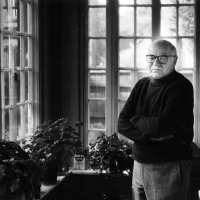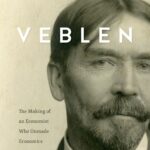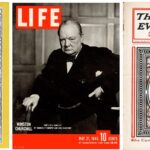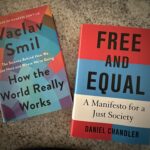 The more I read about the late Daniel Bell, the more I like him. I recently picked up a copy of his classic The Cultural Contradictions of Capitalism. I’ve set it aside to read Fukuyama’s latest, but I intend to pick it up again very soon. The book description from Barnes and Noble: “This classic analysis of Western liberal capitalist society contends that capitalism—and the culture it creates—harbors the seeds of its own downfall by creating a need among successful people for personal gratification—a need that corrodes the work ethic that led to their success in the first place. With the end of the Cold War and the emergence of a new world order, this provocative manifesto is more relevant than ever.”
The more I read about the late Daniel Bell, the more I like him. I recently picked up a copy of his classic The Cultural Contradictions of Capitalism. I’ve set it aside to read Fukuyama’s latest, but I intend to pick it up again very soon. The book description from Barnes and Noble: “This classic analysis of Western liberal capitalist society contends that capitalism—and the culture it creates—harbors the seeds of its own downfall by creating a need among successful people for personal gratification—a need that corrodes the work ethic that led to their success in the first place. With the end of the Cold War and the emergence of a new world order, this provocative manifesto is more relevant than ever.”
Bell gave an interview in September 2010 to Utopian, just a few short months before his death. A brief excerpt:
“I’ve written, as you probably know, that I’m a socialist in economics, a liberal in politics, and a conservative in culture.”
“And you’ve never had any trouble reconciling those?
“Not in the least! I’m against the idea of totality, which is a whole Marxist concept. I believe there are different logics in the different realms. The economy is, more or less, a system in which interdependence is established through the different variables of supply and demand. The polity is not a system, it is an order, held together by coercion and consent. Culture has two dimensions. One is the dimension of forms that exist, and the other is the dimension of meaning …
“Ok, so the realms may be autonomous. But do you not think they are intimately related? In Cultural Contradictions, you write of how America’s crumbling cultural values threaten the economic realm.
“Let me go back for a minute because this is crucial. If there’s no single dimension that runs across these different realms, then what is so special about them? I’m a socialist in economics because I believe that every human being has a right — if you want to put it that way — to a decent living standard. It goes back to Aristotle. If a man is not a member of the polity, he is either a beast or a God. So that there ought to be a “right†to give everybody a decent standard of living. Being a member of the society gives rise to a claim on the economy. I’m a liberal in politics because I believe in merit. And I therefore believe that one’s position in society ought to be determined on the basis of merit. In culture, I’m a conservative because I believe in judgment, forms, and meanings.
“So that’s why I can assume a certain logical coherence to the idea of being a socialist in economics, a liberal in politics, and a conservative in culture.”





